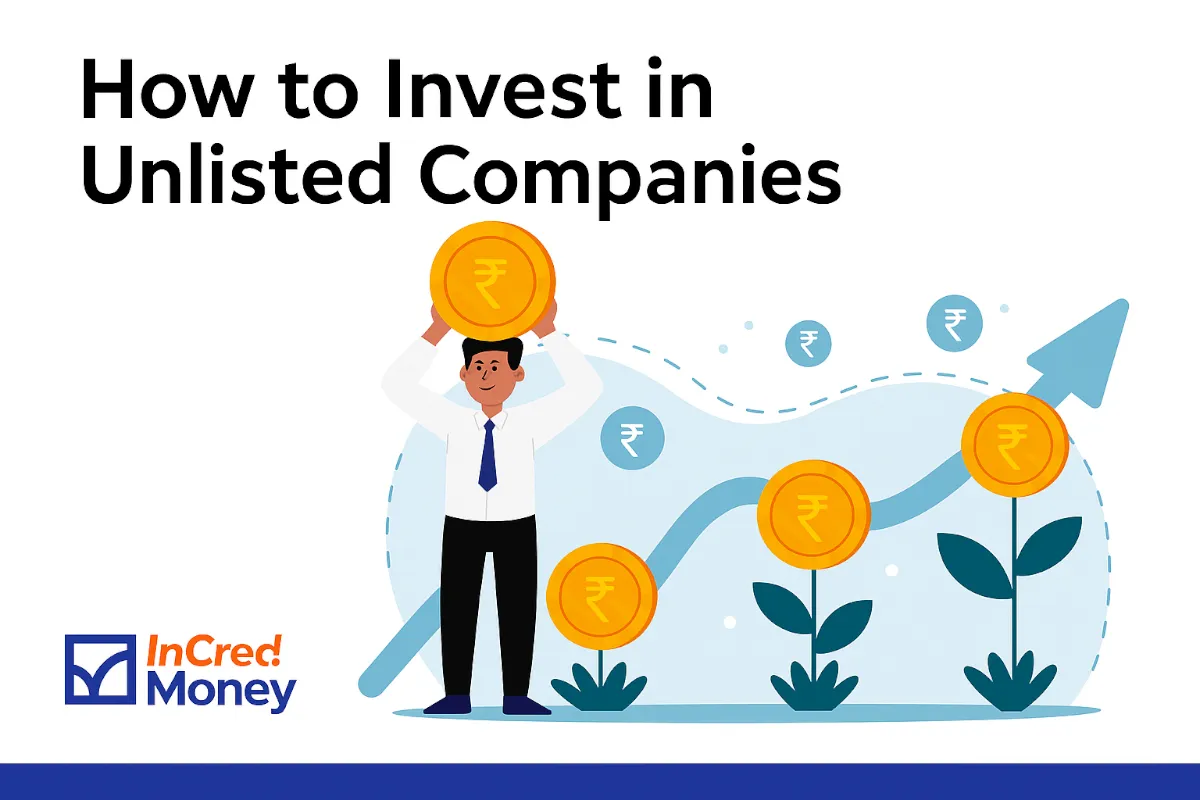
What is an unlisted company, and how to invest in unlisted companies are important questions and this article will help you understand them.
Unlisted companies are companies that are not listed on any recognised stock exchanges in India. So, shares of unlisted companies cannot be traded on any stock exchanges. Unlisted companies are often in early or high-growth stages, and investing in unlisted companies can mean big returns if they do well or eventually go public.
Investors seek unlisted companies for high-growth potential, portfolio diversification, and the chance to earn substantial returns before the company goes public. There are potential risks associated with investing in unlisted companies, and it is always better to do thorough market research before investing in unlisted shares to ensure you make an informed decision.
Let us see how to invest in unlisted companies.
Ways To Invest In An Unlisted Company
1. Through PMS and AIF Schemes
Portfolio Management Services (PMS)
PMS is a customised investment service offered by professional portfolio managers, mainly for high-net-worth individuals. These managers design and manage your portfolio only for you based on your risk profile, investment goals, and preferences. While PMS usually focuses on listed equities, some providers include high-potential unlisted companies, especially pre-IPO opportunities, as part of their strategy.
Alternative Investment Funds (AIFs)
Alternative Investment Funds (AIFs) are pooled investment vehicles regulated by SEBI (in India) that collect money from multiple investors and invest in alternative assets. The idea is to offer access to unique, high-growth investments that are not available through regular mutual funds or public markets.
How PMS and AIF Help Investors Gain Exposure to Unlisted Stocks
Both PMS and AIF offer unique investment opportunities to individuals.
-
In PMS, portfolio managers may allocate a part of your portfolio to pre-IPO or late-stage private companies with strong growth potential. This gives you early exposure to firms that might go public later, possibly at higher valuations.
-
In AIFs, fund managers actively look and invest in promising unlisted companies, including startups and growth-stage firms. Since AIFs pool resources from multiple investors, they can participate in larger deals, spread risks across several unlisted companies, and negotiate better terms.
These structures are ideal for people who want professional management, diversification, and access to private deals without having to individually research or negotiate with private companies.
2. Through the Purchase of ESOPs
Investing in unlisted companies can be done by buying ESOPs (Employee Stock Ownership Plans) from employees.
What are Employee Stock Ownership Plans (ESOPs)?
ESOPs are shares that a company gives to its employees, usually as part of a reward or incentive package. Along with their regular salary, they receive company shares, giving them a stake in the business. As the company grows and does well, the value of these shares can go up, allowing employees to benefit directly from the company’s success.
How Employees Sell Their ESOPs to Investors.
Employees don’t get full ownership of their allocated shares right away. Instead, they go through a vesting period, meaning they earn rights to the shares over a period of time.
Once ESOPs vest and become eligible for sale, employees sometimes sell them to private investors looking to get a stake in a promising unlisted company. These deals often happen through private arrangements.
Risks and Opportunities Associated With ESOP-Based Investments.
Investing in ESOPs offers exciting opportunities and a few risks. On the positive side, it allows investors to gain early access to high-growth startups or private companies, often at a discounted price compared to future valuations. If the company performs well or eventually goes public, the returns can be substantial.
However, there are some risks to consider. ESOP shares can be hard to sell quickly if you need liquidity. There’s also limited access to the financial data of unlisted companies, making it harder to assess the company’s actual condition. There’s a chance the company may not succeed, so the share prices may go down. Additionally, legal and tax issues around buying and selling ESOPs can become a little complex.
3. Through Private Placements
What are Private Placements?
Private placements are when a company sells its shares directly to a small group of selected investors instead of offering them to the public on the stock market. These investors could be high-net-worth individuals, private equity firms, or institutions. Private placements are a way for unlisted companies or startups to raise funds without going through a public listing. The deals are usually made privately, often with the help of financial advisors or through investment networks.
How Private Placements Work
Private placement allows unlisted companies to raise capital by offering shares directly to selected investors without going public. Let us see how private placements work:
1. Quantify Capital Raise Target
The company first analyses how much money it needs and what the funds will be used for, often with the help of financial advisors.
2. Identify Potential Investors
Next, the company looks for interested investors. Generally, the investors are large institutions or high-net-worth individuals.
3. Prepare an Offering Memorandum (PPM)
A detailed document (PPM) is created to attract potential investors. It outlines the business model, financials, how the funds will be used, and possible risks.
4. Investor Presentations
The company presents its proposal in private meetings to convince investors of the opportunity and expected returns.
5. Due Diligence
Investors carefully review the company’s financials and the offering documents to assess risk and potential gain.
6. Finalise Capital Raise
Once the investor list is ready, the company decides the pricing and number of shares or securities to issue.
7. Funds Transfer
Finally, investors transfer the agreed funds to the company, completing the capital-raising process.
The Role of Venture Capitalists and Institutional Investors
Venture capitalists (VCs) and institutional investors often invest in unlisted companies or startups through private placements. They provide large amounts of capital to unlisted companies with high-growth potential. In exchange, they get equity in the company and help the business expand.
VCs typically invest in early-stage startups with high growth potential. At the same time, institutional investors may look at more established private firms. Their involvement also adds credibility to the company, which can attract more investors down the line.
4. Investing in Pre-IPO Companies
What Are Pre-IPO Companies?
Pre-IPO companies are private companies that are preparing to go public through an Initial Public Offering (IPO), I.E, National Stock Exchange Ltd (NSE), NCDEX Ltd, and Oravel Stays Ltd (Oyo Rooms). These companies have already established their business model and shown growth, but they’re not yet listed on a stock exchange.
Investing in pre-IPO companies allows you to buy shares before they hit the public market, often at lower prices. By investing in unlisted companies, you have the chance to benefit from the company’s growth once it’s listed and its valuation increases.
Risks Involved and Key Factors to Consider
● Limited Liquidity
Unlisted shares are not as easy to buy or sell as listed ones because they are traded through specific channels, often involving long-term investors. As a result, the number of potential buyers is smaller, making it difficult to quickly sell your shares when needed. So, it can be an issue if you need money immediately.
● Lack of Information
Unlike listed companies, unlisted companies don’t face the same strict regulatory oversight, meaning they don’t have to disclose as much information. This results in limited access to data about the company’s financial status, strategic goals, and market positioning, increasing uncertainty. Investors typically only receive yearly reports, making it harder to track performance regularly.
● Lenient Regulation
Unlisted shares are not regulated like listed shares, and bodies like SEBI (Securities and Exchange Board of India) do not directly oversee them. Due to this, the credibility of these investments is lower, and the risk of fraudulent activities increases. Without strong oversight and regulations, investors need to be extra cautious.
● Lock-in of Shares
When a company goes public, there’s often a lock-in period, usually around six months, during which shareholders can’t sell their shares. This period is meant to avoid sudden drops in the stock price and to ensure existing shareholders remain committed to the company’s growth. It provides stability but limits the ability to liquidate shares immediately after the IPO.
● Market Risks
Unlisted shares, like listed ones, are sensitive to market risks such as economic downturns, changing market conditions, or shifts in investor sentiment. However, the risk for unlisted companies, particularly startups or pre-IPO companies, is generally higher due to greater volatility, uncertainty, and less predictable growth compared to established public companies.
Incred Money helps streamline the investment process and provides access to a curated selection of promising pre-IPO companies, making it easier for you to invest in unlisted shares.
Conclusion
Investing in unlisted companies can offer significant growth potential but comes with unique risks, such as limited liquidity and lack of transparency. By exploring options like pre-IPO investments, PMS, or AIFs, you can invest in unlisted companies.













